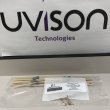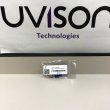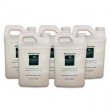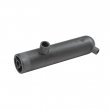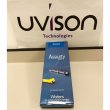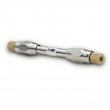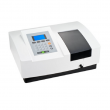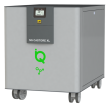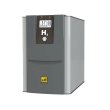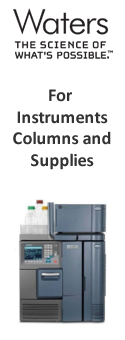Description : EZgeneTM Fungal gDNA Miniprep Kits allow rapid and reliable isolation of high-quality total cellular DNA from a wide variety of Fungal species and tissues. Up to 100 mg of wet tissue (or up to 50 mg dry tissue) can be processed in less than 1 hour. The system combines the reversible nucleic acid-binding properties of Biomiga's matrix with the speed and versatility of spin column technology to eliminate polysaccharides, phenolic compounds, and enzyme inhibitors from fungal tissue lysates. Purified DNA is suitable for PCR, restriction digestion, and hybridization techniques. There are no organic extractions thus reducing plastic waste and hands-on time to allow multiple samples to be processed in parallel. If using the EZgeneTM Fungal gDNA Miniprep Kit for the first time, please read this booklet to become familiar with the procedures before beginning. Dry or fresh fungal tissue is disrupted and then lysed in a specially formulated buffer containing detergent. Proteins, polysaccharides, and cellular debris are subsequently precipitated. Binding conditions are then adjusted and the sample is applied to a DNA spin-column. Two rapid wash steps remove trace contaminants such as residual polysaccharides, and pure DNA is eluted in water or low ionic strength buffer. Purified DNA can be directly used in downstream applications without the need for further purification. All components of the EZgeneTM Fungal gDNA Miniprep Kit are stable for at least 12 months from date of purchase when stored at 22℃-25℃. During shipment or storage in cool ambient conditions, precipitates may form in Buffer FG 3. It is possible to dissolve such deposits by warming the solution at 37℃. Product GD2416-00 GD2416-01 GD2416-02 DNA Columns 4 50 250 2 mL Collection Tubes 8 100 500 Buffer FG 1 5 mL 50 mL 220 mL Buffer FG 2 1.5 mL 10 mL 50 mL Buffer FG 3 1.5 mL 20 mL 90 mL RNase A 20 μL 250 μL 1.1 mL DNA Wash Buffer 2 mL 15 mL 3 x 24 mL Elution Buffer 1.5 mL 15 mL 50 mL User Menu 1 1 1 Prepare all components and get all necessary materials ready by examining this instruction booklet and become familiar with each steps. Important: A. Dry Specimens For processing ≦ 50 mg powdered tissue. Yield is sufficient for several tracks on Southern assay. B. Fresh or Frozen For processing ≦ 100 mg fresh (or frozen) powdered tissue. Yield is similar to A. Problem Possible reason Suggestions Clogged well Carry-over of debris. Following precipitation with Buffer FG 2, make sure no particulate material is transferred. DNA pellet not completely dissolved before applying sample to column. In protocols A and B, ensure that DNA is dissolved in water before adding Buffer FG 3 and ethanol. This may need repeated incubation at 65 oC and vortexing. Sample too viscous. In protocol C, do not exceed suggested amount of starting material.Alternatively, increase amounts of Buffers FG 1 and FG 2 and use two or more columns per sample. Incomplete precipitation following addition of FG 2. Increase RCF or time of centrifugation after addition of Buffer FG 2. Low DNA yield Incomplete disruption of starting material. For both dry and fresh samples, obtain a fine homogeneous powder before adding Buffer FG 1. Poor lysis of tissue. Decrease amount of starting material or increase amount of Buffers FG 1 and FG 2. DNA remains bound to column. Increase elution volume to 200 μL and incubate on column at 65 oC for 5 min before centrifugation. DNA washed off. Dilute Wash Buffer Concentrate by adding appropriate volume of absolute ethanol prior to use (page 3). Problems in downstream applications Salt carry-over. DNA Wash Buffer must be at room temperature. Ethanol carry-over Following the second wash spin, ensure that the column is dried by centrifuging 2 min at maximum speed. This product is intended for in vitro research use only. Not for use in human. This product is warranted to perform as described in its labeling and in Biomiga's literature when used in accordance with instructions. No other warranties of any kind, express or implied, including, without limitation, implied warranties of merchantability or fitness for a particular purpose, are provided by Biomiga. Biomiga's sole obligation and purchaser's exclusive remedy for breach of this warranty shall be, at the option of Biomiga, to replace the products, Biomiga shall have no liability for any direct, indirect, consequential, or incidental damage arising out of the use, the results of use, or the inability to use it product. For technical support or learn more product information, please contact us at (858) 603-3219 or visit our website at http://www.biomiga.com/. Operating Protocol Introduction
Overview
Storage and Stability
Kit Contents
Before Starting
Trouble Shooting Guide
Limited Use and Warranty
- Model: GD2416-01
- Manufactured by: Biomiga



